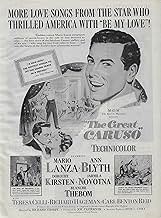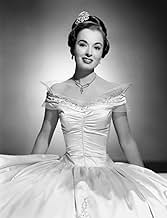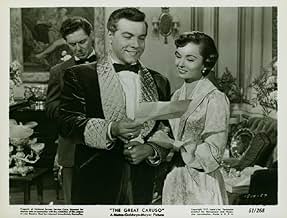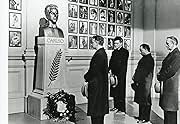Füge eine Handlung in deiner Sprache hinzuThe film explores the life of tenor Enrico Caruso, a vocalist who faces rejection from Musetta and Dorothy, and struggles to find acceptance in New York.The film explores the life of tenor Enrico Caruso, a vocalist who faces rejection from Musetta and Dorothy, and struggles to find acceptance in New York.The film explores the life of tenor Enrico Caruso, a vocalist who faces rejection from Musetta and Dorothy, and struggles to find acceptance in New York.
- Regie
- Drehbuch
- Hauptbesetzung
- 1 Oscar gewonnen
- 4 Gewinne & 6 Nominierungen insgesamt
- Antonio Scotti
- (as Paul Javor)
- Caruso (as boy)
- (as Peter Edward Price)
Empfohlene Bewertungen
Like Caruso before him, and long before the Three Tenors and Andrea Bocelli, Lanza became THE tenor superstar of his generation. If there is anyone who wants to know why, just listen to him sing some of the magnificent arias in this film. "Cielo e Mar," "E Lucevan le stelle," and especially his matchless "Vesti la Giubba," are evidence enough that Lanza could, indeed, have become bigger than Caruso, had not his excesses caught up with him at such a young age.
I have just a couple of negative comments to insert here. First, the plot, while it makes for a good story, actually has very little to do with Caruso's life (Read Enrico Caruso Jr.'s "Caruso: My Father and My Family" for a good, readable biography. He even compliments Lanza and his performance!). For one thing, Caruso didn't die on stage, but several months after that last performance at the Metropolitan. Second, the "Italian" mannerisms in this movie are straight out of the Henry Armetta/"Life with Luigi" school, stereotyped to the hilt.
But, given the overall scheme of things, these are relatively minor complaints. As to the rest, I say that, for those of you who've never heard Lanza and wonder why he was so great, this film will give you ample proof. For those of you who were there when Lanza was in his prime, here's a chance to live it all over again. A great film, and a matchless tribute to TWO of the legendary voices of our time.
Flaws aside, The Great Caruso is still a very good film. For starters it is gorgeous to watch. The costumes, sets and cinematography are absolutely amazing and just a feast to the eyes. Even better is the music, the music is like a treasure trove of some of the greatest tenor arias ever written. We have La Donna E Mobile from Rigoletto, Celeste Aida from Aida and Vesti La Giubba from Pagliacci, not to mention the charming The Loveliest Night of the Year beautifully sung by Ann Blyth.
I have little to complain about the performances either. Ann Blyth, Dorothy Kirsten(an underrated singer), Alan Napier, Paul Javor and Jarmila Novotna are all wonderful. I have yet to talk about the best performance, it is easy enough to say that Mario Lanza gave the best performance but vocally and acting-wise. How do you like that? A singing legend portraying another? Lanza is absolutely brilliant, he is in fine voice and wholly believable here, it is such a shame his career was cut so short. You may argue that Caruso and Lanza sound familiar in voice, personally I don't think they do. Whereas Lanza had a rich lyrical voice, Caruso's was somewhat darker and perhaps more dramatic. There is nothing wrong with that, both had naturally beautiful voices that sing all those arias with effortless ease.
Overall, flawed, but well worth seeing for the music and Mario Lanza. You may be disappointed if you are looking for a true historical music lesson, but if you want a biopic with gorgeous visuals and music I think you have met your match in The Great Caruso. 7/10 Bethany Cox
Wusstest du schon
- WissenswertesThis was the next-to-last completed MGM film under Louis B. Mayer's supervision (the last was Mississippi-Melodie (1951), released in the summer of that year). A proxy fight soon after would see him removed as the head of the studio he helped to found. He was replaced by his former chief of production, Dore Schary. Mayer ran MGM for 27 years, Schary for barely 6.
- PatzerOpening credits: The events, characters and firms depicted in this photoplay are fictitious. Any similarity to actual persons, living or dead, or to actual firms is purely coincidental. Says it ALL.
- Zitate
Enrico Caruso: It is true, Señor Barretto, that right now I sing for pennies. Pennies are not very important in a big house like this. But the singing, that is important everywhere. It makes people feel good inside, takes away the ugliness, the sadness, and it fills the empty place here. That too is something Señor, isn't it?
- Crazy CreditsOpening credits: The events, characters and firms depicted in this photoplay are fictitious. Any similarity to actual persons, living or dead, or to actual firms is purely coincidental.
- VerbindungenFeatured in The Metro-Goldwyn-Mayer Story (1951)
- SoundtracksThe Loveliest Night of the Year
Lyrics by Paul Francis Webster
Music adaptation by Irving Aaronson
Also performed by Ann Blyth (uncredited)
Adapted from "Sobre las olas" (uncredited)
Music by Juventino Rosas
Top-Auswahl
- How long is The Great Caruso?Powered by Alexa
Details
- Erscheinungsdatum
- Herkunftsland
- Sprachen
- Auch bekannt als
- El gran Caruso
- Drehorte
- Metro-Goldwyn-Mayer Studios - 10202 W. Washington Blvd., Culver City, Kalifornien, USA(studio: made in Hollywood, U.S.A.)
- Produktionsfirma
- Weitere beteiligte Unternehmen bei IMDbPro anzeigen
- Laufzeit1 Stunde 49 Minuten
- Seitenverhältnis
- 1.37 : 1



































